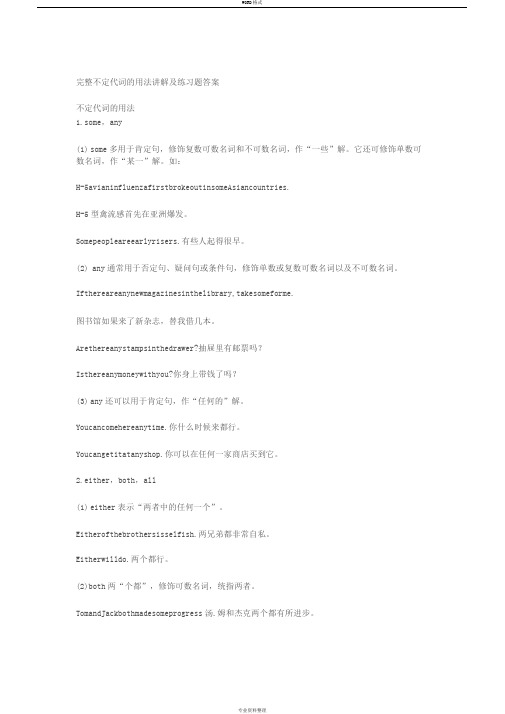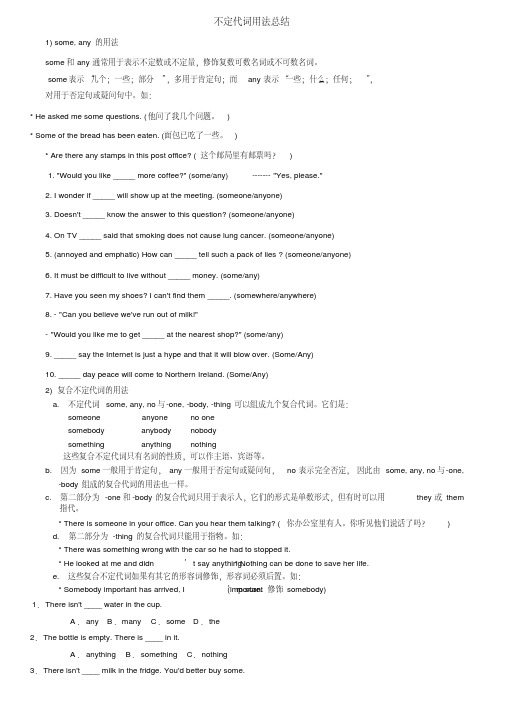(完整版)不定代词用法总结及配套练习题
不定代词详解及练习题

英语代词用法详解·不定代词不明确指代某个特定的人或事物的代词叫不定代词。
英语中的不定代词常常成对出现,如some 和any, all 和both, neither 和either, each 和every, other 和another, much 和many, one 和no, none和no one, few 和a few,little 和a little,等等。
另外,还有由some, any, every, no 与body, one, thing构成的复合不定代词(somebody, anybody, everybody, nobody, someone, anyone, everyone, no one, something, anything, everything, nothing)。
1. some 和anysome 和any都可修饰或指代可数名词和不可数名词;some 一般用于肯定句,any一般用于疑问句和否定句。
如:I must get some fruit in the market. 我得在市场上买点水果。
Do you have any books for children? 你有适合小孩子看的书吗?【说明】(1)当表示请求或要求并希望对方能给出肯定的回答时,some 也可用于疑问句;any 表示“任何的”之意时,也可用于肯定句。
如:Can you give me some paper? 你能给我些纸吗?Would you like some bananas? 你想吃点香蕉吗?You can read any of the books. 你可以看这些书中的任何一本。
(2) some 和any均不能跟冠词连用。
2. all 和both(1) all 表示三者或三者以上的人或物;both只能表示两者。
如:Copper and silver are both metals. 铜和银都是金属。
(完整版)不定代词othersanther用法与练习

(完整版)不定代词othersanther用法与练习引言在英语中,不定代词是一类特殊的代词,用于代替不确定或未指明具体对象的情况。
其中,others和another是两个常用的不定代词。
本文将介绍它们的用法和提供一些练,以帮助提高对它们的理解和运用。
不定代词others的用法1. 具体对象的代替不定代词others用于代替一个或多个具体的对象,表示除了已提及的对象之外的其他人或事物。
例句:- I have finished my work, but others are still working.- Some people like apples, while others prefer oranges.2. 表示多种选择不定代词others还可以用于表示多种选择中的其他选项。
例句:- Some people enjoy swimming, hiking, or cycling, among others.3. 复数形式的代替不定代词others可以替代复数名词,表示复数或未指明数量的事物。
例句:- The students brought their books, pencils, and others for the class.不定代词another的用法1. 指代一个额外的事物不定代词another用于表示额外的、与已提及的事物类似的事物。
例句:- I have finished one book, and now I am starting another.2. 表示另一个选择不定代词another还可以表示另一个可选的选择。
例句:- I don't like this color, show me another.3. 表示重复的动作或情况不定代词another还可以用于表示重复的动作或情况。
例句:- He made the same mistake again. He needs to try another approach.练请根据下列句子中的上下文,选择合适的不定代词填空。
完整不定代词的用法讲解及练习题答案

完整不定代词的用法讲解及练习题答案不定代词的用法1.some,any(1)some多用于肯定句,修饰复数可数名词和不可数名词,作“一些”解。
它还可修饰单数可数名词,作“某一”解。
如:H-5avianinfluenzafirstbrokeoutinsomeAsiancountries.H-5型禽流感首先在亚洲爆发。
Somepeopleareearlyrisers.有些人起得很早。
(2)any通常用于否定句、疑问句或条件句,修饰单数或复数可数名词以及不可数名词。
Ifthereareanynewmagazinesinthelibrary,takesomeforme.图书馆如果来了新杂志,替我借几本。
Arethereanystampsinthedrawer?抽屉里有邮票吗?Isthereanymoneywithyou?你身上带钱了吗?(3)any还可以用于肯定句,作“任何的”解。
Youcancomehereanytime.你什么时候来都行。
Youcangetitatanyshop.你可以在任何一家商店买到它。
2.either,both,all(1)either表示“两者中的任何一个”。
Eitherofthebrothersisselfish.两兄弟都非常自私。
Eitherwilldo.两个都行。
(2)both两“个都”,修饰可数名词,统指两者。
TomandJackbothmadesomeprogress汤.姆和杰克两个都有所进步。
Bothofthemshouldmakeconcessions.他们双方都应做出让步。
(3)all全“部,所有的”,修饰可数名词和不可数名词,指两个以上的人或物。
Allthestudentscontributedtothefund.所有的学生都为基金会捐了款。
Allofthemoneyhasbeenspent.钱都花完了。
Weareallforyou.我们都支持你。
Sayallyouknowandsayitwithoutreserve.知无不言,言无不尽。
(完整版)不定代词用法及练习

不定代词不指明代替任何特定名词或形容词的代词,在句中可作主语、表语、宾语和定语。
Ⅰ.不定代词包括:all , both, every, each, either, neither, more,(a) little, (a) few, much, many, another, other, some, any , one以及some, something, anything, everything, somebody, someone, anybody, anyone, nothing , nobody,no one, none, everybody, everyone.等。
一般来讲,修饰不定代词的词要置于其后。
Ⅱ,不定代词用法为:不定代词+(of + 限定词)+ 名词注意:of 后一定要有限定词both, all可以直接接限定词theⅢ.几组常用不定代词的区别:1.代词比较one,that 和itone表示泛指,指名称相同的另一物,或所提到的人或物中的一个。
that和it 表示特指。
that 与所指名词为同类,但不是同一个,而it 与所指名词为同一个。
I can't find my hat. I think I must buy one.The hat you bought is bigger than that I bought.I can't find my hat. I don' t know where I put it.2. some与any的区别1)some多用于肯定句,表示“一些,几个”作形容词时,后面可以接①不可数名词+单数动词;②可数名词+复数动词。
Look! Some of the students are cleaning the library.Some rice in the bag has been sold out.2)any多用于疑问句、条件句和否定句中,表示“一些,任何”用作形容词时,后面可以接①不可数名词+单数动词;②可数名词+复数动词。
总复习(四)不定代词用法与练习题

总复习(四)不定代词用法与练习题Mr. Liu 2012-4-5不指明代替任何特定名词或形容词的代词叫做不定代词。
一、不定代词的用法不定代词大都可以代替名词和形容词,在句中作主语、宾语、表语和定语。
1.作主语Both of them are teachers.他们两人都是教师。
2.作宾语I know nothing about this person.我对这个人一无所知。
3.作表语This book is too much for a child.这本书对一个小孩来说太难了。
4.作定语There is a little water in the glass.玻璃杯里有一些水。
二、常用不定代词用法举例1.some 一些,某些,某个不定代词some可以代替名词和形容词,常用在肯定句中作主语、宾语、定语等。
作定语时,它可以修饰可数名词(单、复数皆可)和不可数名词。
2.any一些,任何不定代词any可以代替名词和形容词,常用在否定句或疑问句中作主语、宾语、定语等。
作定语时,它可以修饰可数名词(多为复数)和不可数名词。
例如:There isn‘t any ink in my pen.我的钢笔没有墨水。
(作定语)不定代词any有时也可以用在肯定句中,表示"任何的"。
例如:You may come at any time;I‘ll be home the whole day.你任何时候来都行,我整天都将呆在家里。
3.all 全体,所有不定代词all代表或修饰可数名词时,指两个以上的人或物。
作先行词时,引导词用that。
例如:All were present at the meeting.全都到会了。
(作主语,代表可数名词)4.both 全部,都不定代词both指两个人或事物。
5.none 无人或无物不定代词none的含义和all相反,和no one,not any同义,但其用法相当于名词,在句子中一般作主语或宾语。
不定代词的用法及练习

不定代词的用法与练习 ( 第一部分 )表一:表二:单数 单数 ≥3 每一个every 单数 单数 ≥2 每一个 each单数或复数 ○ ≥3 三者或三者以上都不 none 单数或复数 单数或复数 ≥3 三者或三者以上都 all 单数 单数 =2 两者都不 neither 单数 单数 =2 两者中的任何一个 either 复数 复数 =2 两者都 both 作主语时动词的数 作定语时名词的数 数量关系 含义 不定代词1. all 注意下列词组的意义above all after all in all not at all all of sudden all at onceall or nothing all up for all once (and) for all with all all over练习题(并翻译其含义、注意all的用法)1)All _________(be) here and now you may begin your lecture.2)All things ________(be ) difficult before they become easy.3)All that he talked about at the meeting _______(be) something aboutenvironment protection.4)All his money ________(be) spent on spirits and bobacco.5)I love her with _______________ but she doesn’t seem to care ( 全心全意地爱)6)You ca hardly imagine such a little boy eating ________________.( 整个面包)7)You can see smiling faces ______________________( 全中国)8)_______________ was devoted to looking after the disabled children.(他一生)9)She told me the news in _________ honesty. (非常诚实)10)She is all ears whenever she listens to a lecture. _______________11)He is all skin and bones. _______________改错1)All them have passed the important examination .2)I like all them .3)I like them all.4)All of the six girls are from the country side.5)The students all are interested in helping one another in English learningin our class.6)The students like all finished writing their research papers.7)How clever you are all.8)They devoted their all spare time to helping the poor.9)They devoted ________ spare time to helping the poor.A, all their B, their all C, all of their D, of their all __________________(不是所有的学生)understood what the professor was saying.2. each、every①each指代前文的名词②each 、each one 、everyone、every +单数名词、可以用单数或复数的人称代词③each 、each one 、every one与of 连用。
(完整版)不定代词用法总结及配套练习题

不定代词用法总结1) some, any的用法some和any通常用于表示不定数或不定量,修饰复数可数名词或不可数名词。
some表示“几个;一些;部分”,多用于肯定句;而any表示“一些;什么;任何;”,对用于否定句或疑问句中。
如:* He asked me some questions. (他问了我几个问题。
)* Some of the bread has been eaten. (面包已吃了一些。
)* Are there any stamps in this post office? (这个邮局里有邮票吗?)1. "Would you like _____ more coffee?" (some/any) -------"Yes, please."2. I wonder if _____ will show up at the meeting. (someone/anyone)3. Doesn't _____ know the answer to this question? (someone/anyone)4. On TV _____ said that smoking does not cause lung cancer. (someone/anyone)5. (annoyed and emphatic) How can _____ tell such a pack of lies ? (someone/anyone)6. It must be difficult to live without _____ money. (some/any)7. Have you seen my shoes? I can't find them _____. (somewhere/anywhere)8. - "Can you believe we've run out of milk!"- "Would you like me to get _____ at the nearest shop?" (some/any)9. _____ say the Internet is just a hype and that it will blow over. (Some/Any)10. _____ day peace will come to Northern Ireland. (Some/Any)2) 复合不定代词的用法a. 不定代词some, any, no与-one, -body, -thing可以组成九个复合代词。
(完整版)不定代词otherothers用法与练习

(完整版)不定代词otherothers用法与练习不定代词"other"和"others"的用法与练不定代词是表示不确定对象或数量的词语。
"other"和"others"是常见的两个不定代词,它们在句子中有着不同的用法和含义。
本文将介绍它们的使用规则并提供练,以帮助加深理解。
1. "other"的用法- "other"作为形容词,表示"其他的"或"别的"。
它可以修饰名词,并在句子中充当定语的角色。
- 例1:I have two pens. The other pen is blue.(我有两支钢笔。
另一支是蓝色的。
)- "other"作为代词,表示"其他人"、"其他事物"或"其他的一个"。
它可以代替先前提到的事物或人,并在句子中充当主语、宾语或指示代词的角色。
- 例3:He took one book, and I took the other.(他拿了一本书,我拿了另一本。
)- 例4:Some people like coffee, while others prefer tea.(有些人喜欢咖啡,而另一些人则喜欢茶。
)2. "others"的用法- "others"作为代词,表示"其他人"、"其他事物"或"其他的人"。
它常常与"the"连用,并在句子中充当主语或宾语的角色。
- 例5:Some students like English, and others prefer math.(一些学生喜欢英语,其他的则更喜欢数学。
)- 例6:Some books are interesting, while others are boring.(有些书很有趣,其他的则很无聊。
- 1、下载文档前请自行甄别文档内容的完整性,平台不提供额外的编辑、内容补充、找答案等附加服务。
- 2、"仅部分预览"的文档,不可在线预览部分如存在完整性等问题,可反馈申请退款(可完整预览的文档不适用该条件!)。
- 3、如文档侵犯您的权益,请联系客服反馈,我们会尽快为您处理(人工客服工作时间:9:00-18:30)。
不定代词用法总结1) some, any的用法some和any通常用于表示不定数或不定量,修饰复数可数名词或不可数名词。
some表示“几个;一些;部分”,多用于肯定句;而any表示“一些;什么;任何;”,对用于否定句或疑问句中。
如:* He asked me some questions. (他问了我几个问题。
)* Some of the bread has been eaten. (面包已吃了一些。
)* Are there any stamps in this post office? (这个邮局里有邮票吗?)1. "Would you like _____ more coffee?" (some/any) -------"Yes, please."2. I wonder if _____ will show up at the meeting. (someone/anyone)3. Doesn't _____ know the answer to this question? (someone/anyone)4. On TV _____ said that smoking does not cause lung cancer. (someone/anyone)5. (annoyed and emphatic) How can _____ tell such a pack of lies ? (someone/anyone)6. It must be difficult to live without _____ money. (some/any)7. Have you seen my shoes? I can't find them _____. (somewhere/anywhere)8. - "Can you believe we've run out of milk!"- "Would you like me to get _____ at the nearest shop?" (some/any)9. _____ say the Internet is just a hype and that it will blow over. (Some/Any)10. _____ day peace will come to Northern Ireland. (Some/Any)2) 复合不定代词的用法a. 不定代词some, any, no与-one, -body, -thing可以组成九个复合代词。
它们是:someone anyone no onesomebody anybody nobodysomething anything nothing这些复合不定代词只有名词的性质,可以作主语、宾语等。
b. 因为some一般用于肯定句,any一般用于否定句或疑问句,no表示完全否定,因此由some, any, no与-one,-body组成的复合代词的用法也一样。
c. 第二部分为-one和-body的复合代词只用于表示人,它们的形式是单数形式,但有时可以用they或them指代。
* There is someone in your office. Can you hear them talking? (你办公室里有人。
你听见他们说话了吗?)d. 第二部分为-thing的复合代词只能用于指物。
如:* There was something wrong with the car so he had to stopped it.* He looked at me and didn’t say anything. * Nothing can be done to save her life.e. 这些复合不定代词如果有其它的形容词修饰,形容词必须后置。
如:* Somebody important has arrived, I’m sure. (important修饰somebody)1.There isn't ____ water in the cup.A.any B.many C.some D.the2.The bottle is empty. There is ____ in it.A.anything B.something C.nothing3.There isn't ____ milk in the fridge. You'd better buy some.A.no B.any C.some4.Everything______ready.We can start now.A.areB.isC.beD.were5.There’s______with his eyes.He’s OK.A.anything wrongB.wrong somethingC.nothing wrongD.wrong nothing6.—The story is so amazing!It’s the most interesting story I’ve ever read.—But I’m afraid it won’t be liked by______.A.everybodyB.somebodyC.anybodyD.nobody7.She listened carefully,but heard______.A.anyoneB.someoneC.everyoneD.nothing8.I agree with most of what you said,but I don’t agree with______.A.everythingB.anythingC.somethingD.nothing9.—Everyone is here today,______?—No,Han Mei isn’t here.She’s ill.A.isn’t itB.isn’t heC.are theyD.isn’t everyone10.Everything goes well,______?A.is itB.isn’t itC.do theyD.doesn’t it3) none 与no one 的用法区别None和no one 都表示“三者或者三者以上的另一个”,但是用法不一样。
None既指人也指物,它常与of 短语连用None of us failed the exam.I have read none of the books.在回答以how many,how much 开头得疑问句时要用none。
No one 只能用来指人,不能指物,且不能与of短语连用,回答以who开头的疑问句时要用no one。
No one knows the answer to the question.1._________of them can speak Russian.A.No oneB.NooneC.NoneD.Nobody2._______can answer my question.A.No oneB.NooneC.NoneD.No body3.Who is in the classroom?A.No oneB.NooneC.NoneD.No body4.How many hours does Jim play taiji every day?A.No oneB.NooneC.NoneD.Nobody5.How much water is in the cup?A.No oneB.NooneC.NoneD.Nobody4) all, every, each, other, another, either, neither, botha. every只有形容词的性质,在句中作定语。
常用于修饰单数的可数名词。
表示“每个;各个”,还可以表示“一切”。
* After the strong wind every flower in the garden was gone.every还可以和-one, -thing, -body构成复合不定代词,即:everyone, everything, everybody。
其中,everyone和everybody 用于指人,意思一样,都是“每人;大家”,形式上表示单数意思上可以表示单数也可以表示复数。
everything用于指物,意思是“每件事;一切”,形式上表示单数意思上可以表示单数也可以表示复数。
如:* One can’t have everything. * Everything goes well with me.注意:在使用everyone时要注意和every one相区别。
everyone是一个不定代词而every one是一个词组,前者只能指人而后者既可以指人也可以指物。
请注意下列例句:* Everyone will be here except Patrick. (everyone 指人) * Every one of the children will get a gift. (every one也指人)*We played several matches against the visitors, but unluckily lost every one. (every one指物)b. each的意思是“每个;各自的”,可以指人,也可以指物。
如:* I leave home at 7 a.m. each day. * Each of them has received a letter.由于each和every的意思相近,都表示“每一个”,因此要特别注意它们的区别。
each所描述的对象至少是两个数目中的每一个,而every所描述的对象至少是三个数目中的每一个;every着重强调整体的含义而each着重强调个别;every只能作形容词放于名词前而each可以作形容词、代词和副词。
如:(每一个人都知道应该做什么/他的工作。
)(在这两个句子中用every和each都可以)*You can see a lot of new shops on each side of the street. (因为街道只有两边因此不能用every)*Each has too coats. (each是代词不能换用every)c. other可以指人也可以指物,表示“另外的人或事物”,其后可以接单数或复数的名词;此外,other也有复数形式,是others。
